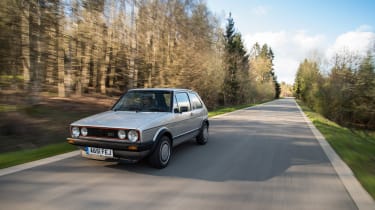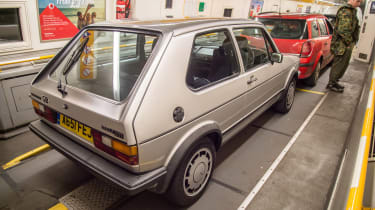Volkswagen Golf GTI Mk1 road trip - Wolfsburg Calling
We drive an original Mk1 Golf GTI 850 miles back to its birthplace to celebrate four decades since the first rolled down the Wolfsburg line
You should never buy a car with the intention of making money, but it’s long vexed me that various cars that have at one time or another resided on my shopping list have inexorably risen in value, while those I’ve actually bought have evaporated worth like petrol spilt on a forecourt.
This first-generation Golf GTI is a painful reminder of this. In around 2009 my shortlist for a characterful, fun car was narrowing, and a Mk1 Golf GTI was one of the few remaining candidates. The reason for this wasn’t any specific love of Volkswagens, more the fact I could pick up a very tidy example for about fifteen-hundred quid, which seemed like a bit of a bargain.
Predictably, values of ’70s and ’80s icons are now rising sharply and today you’d be lucky to get a ropey project Mk1 for that. Around five grand seems a more common starter figure, and there’s an ever-growing maximum above that. Okay, it would hardly have been a windfall, and I’m certain the cost of upkeep in the intervening years would have matched any gains. I’ve never really thought about it since, but with a box-fresh GTI at my disposal, it’s put a new spin on the next few days and poses my first question: did I miss out?
Over the next 850 miles or so there’ll be plenty of time to ponder that question. This particular GTI, from Volkswagen’s UK heritage fleet and seen before on these pages, is a 1984 example, making it a late very Mk1. The first Mk2 GTIs landed in the UK in March that same year, but a series of subtle tweaks had kept the Mk1 fresh enough to overlap its replacement at dealers. Our mission is to drive this one to Wolfsburg – home of Volkswagen – and pick up the very latest Golf GTI, a Mk7 in Clubsport form. My second question writes itself: can a GTI from 1984 make the journey as easily as an example built over three decades later?
We needn’t deconstruct the GTI’s conception here (to summarise: originally a skunkworks ‘Sport Golf’ project built after-hours by Golf engineers, picked up by the board, launched to great acclaim), but a history of the GTI is ostensibly a history of the hot hatchback itself. Simple in the early days, gradually putting on weight and losing precision, subsequently turbocharged and then benefitting from tyre and engineering improvements that turned the concept into the immensely talented all-rounders we have today. Question three: does the original GTI still feel like a proper hot hatchback in a modern context?
By the time ‘our’ GTI was rolling off the production line, the Golf was under fire from all angles and the concept of the ‘hot hatch’ was in full swing. Virtually all followed the simple formula of dropping a potent engine into an otherwise standard production hatchback shell, spritzing it up with some visual fripperies inside and out and tuning the suspension for greater cornering prowess.
It’s easy to see the Mk1’s in influence in today’s hatches – performance that punches above its weight, practicality, precision, a wieldy size, and relative affordability. A modern Golf GTI is to something like the Mazda MX-5 what the original was to an MGB – a car that offers more in performance and usability than it sacrifices from an unremarkably square-edged silhouette. To my eyes, it looks great: four-square stance, pristine Pirelli P-slot alloys and that red stripe around the grille – broken only by the outer pair of headlights, this later car sporting an extra pair of driving lights over early models. My fourth and final question: does the boxy little Golf have the visual clout to attract attention, as any good GTI should?
Having collected photographer Aston Parrott from Hertford on the way to the Channel Tunnel, the Mk1 is already demonstrating its abilities as an all-rounder. The boot has swallowed all but one item of luggage, Aston’s car-cleaning gear having to reside on the back seat, and the Golf cruises happily along the motorway at an indicated 3500rpm and 80mph. No wanton speeding here though, officer – my ageing satnav highlights the Golf’s wildly optimistic speedometer (source of much amusement later in the trip), and we sit on the nail of 70mph until our exit appears.
Speeds climb through France. The GTI laps it up. Being a later car, this example uses a 112bhp, 1.8-litre engine rather than the original 108bhp 1.6. It’s a long way from being powerful by modern standards, but in its day there was enough punch to see off the more traditional sports car choices, and even today its 8.1sec 0-60mph dash would dispatch a Suzuki Swift Sport and snap at the heels of a Mini Cooper.
What’s more surprising from a modern perspective is how smoothly the eight-valve four-pot revs. The 1.8 develops 109lb ft at 3500rpm (compared to a less relaxed 103lb ft at 5000rpm from the 1.6), and while there’s a bit of spluttering at very low engine speeds as the Bosch K-Jetronic injection struggles to meet the fuel-air ratio required for progress, it pulls with admirable strength all the way to the red line. Light weight helps: at 840kg, the GTI is 14kg lighter than a VW Up.







